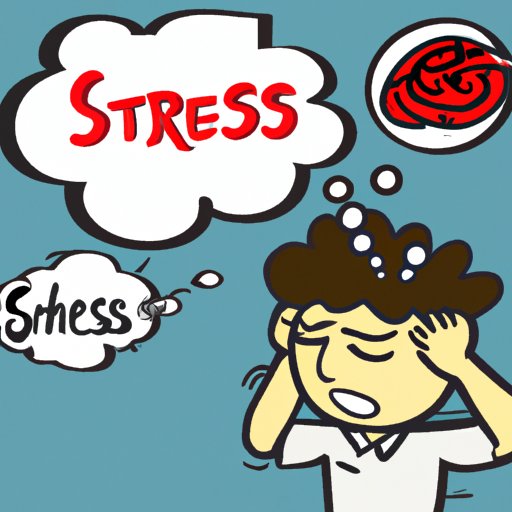
I. Introduction
Stress is something that we all experience from time to time. Whether it be due to work, school, or personal life, stress can take a toll on our mental and physical health. One symptom of stress that many people may not be aware of is vomiting. Understanding the connection between stress and vomiting is important for managing one’s health. In this article, we will explore the science behind stress-induced vomiting and different coping strategies to manage this physical response to stress.
II. Exploring the Connection between Stress and Vomiting: A Comprehensive Guide
Before delving deeper into the connection between stress and vomiting, it is important to understand what stress is. Stress is a response to a threat or pressure, whether it be physical or mental. There are two types of stress: acute and chronic. Acute stress is short-term stress, such as a stressful event. Chronic stress, on the other hand, is long-term stress that can have negative effects on physical and mental health. Symptoms of stress can vary from person to person, but may include things like headaches, fatigue, and muscle tension.
When we experience stress, the body responds by releasing hormones such as adrenaline and cortisol. These hormones trigger a “fight or flight” response, preparing the body to either fight the perceived threat or flee from it. However, in some cases, the body responds by vomiting.
III. Can Emotional Turmoil Really Make You Sick? Everything You Need to Know
Our emotions can have a powerful impact on our physical health. Emotional triggers such as anxiety, fear, and grief can all lead to vomiting. These emotions can cause an increase in stomach acid, leading to nausea and vomiting. Coping strategies for emotional distress may include deep breathing exercises, mindfulness meditation, or speaking with a trained professional such as a therapist.
IV. Understanding the Science behind Stress-Induced Vomiting: A Deep Dive
To understand the connection between stress and vomiting, it is important to understand the role of the digestive system. The digestive system plays a crucial role in our overall health, breaking down food so that it can be absorbed by the body. The digestive system is also linked to the brain through the brain-gut axis. When we experience stress, the brain-gut axis can become disrupted, leading to physical symptoms such as vomiting.
When stress occurs, the body produces a hormone called corticotrophin-releasing factor (CRF). CRF signals the brain to release hormones that activate the “fight or flight” response. This response can cause the body to slow down or even stop digestion. As a result, food can accumulate in the stomach, leading to nausea and vomiting.
V. Nausea and Vomiting: Unleashing the Mysteries of Mind-Body Connection
The mind-body connection is a powerful thing. Negative emotions can manifest into physical symptoms such as nausea and vomiting. Consequently, managing stress-induced nausea and vomiting can be done through physical activity, self-care strategies, and relaxation techniques. These may include deep breathing exercises, yoga, or even taking a walk outside in nature.
VI. The Dark Side of Stress: When Anxiety Takes a Toll on Your Digestive System
Long-term stress can have negative impacts on the digestive system. Prolonged periods of stress can lead to chronic inflammation of the gastrointestinal tract, which can cause vomiting, diarrhea, and abdominal pain. These symptoms can significantly affect one’s quality of life and overall health. Addressing stress through therapy, medication, or lifestyle changes can prevent long-term health issues.
VII. Debunking the Myths: Separating Fact from Fiction on Stress and Nausea
There are many myths surrounding stress and nausea. A common myth is that vomiting can occur from eating too much. However, vomiting from stress is related to the body’s response to stress, not the amount of food consumed. Another myth is that only people with weak stomachs experience vomiting from stress. In reality, anyone can experience vomiting as a physical response to stress.
VIII. Conclusion
Stress-induced vomiting can be a scary and uncomfortable symptom of stress. Understanding the connection between stress and vomiting is important for managing overall health. Emotion triggers such as anxiety, fear, and grief can cause vomiting, but coping strategies such as self-care, relaxation techniques, and therapy can help manage stress and prevent long-term health issues. Remember, seeking help if necessary is important, because better stress management can lead to a healthier and happier life.




